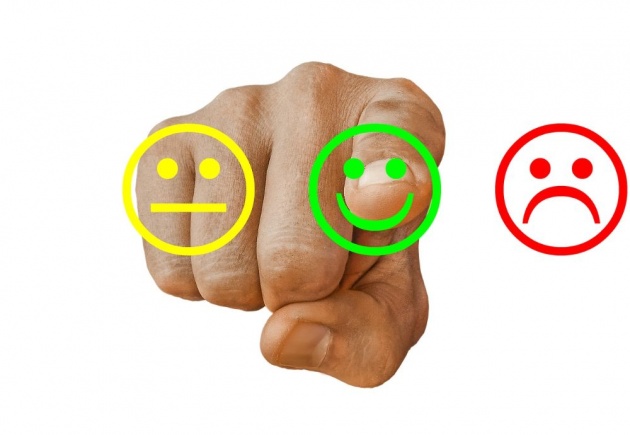
Photo Credit: mcmurryjulie via Pixabay
Hello, guys!
Long time since I wrote here for the last time. Many things changed in my life during this period - and most importantly - I do believe all changes are for the better. I've been working very hard on several projects at the same time, trying to take a breath and find just a little bit time for myself.
Now, things are getting slower - still tons of work, but at least I'm writing here, and that's a good sign. As usual, finding the right topic was again a challenge but... I remembered that many of my friends go and check forums or online review websites for a product or a service before they purchase it. That's why I'd like to give my opinion about this "shopping method", the way I see it, and is it really that helpful?
The fact is, 90% of consumers read online reviews before visiting a business. And 88% of consumers trust online reviews as much as personal recommendations.
– Invesp
Giving an opinion online is easy - many people leave their contribution to the web by describing an experience with a given product they've tried. The question is what's behind the words? Let's see:
1. Providing feedback or a review is personal.

Photo Credit: geralt via Pixabay
Before trusting someone's opinion online, you should know that it's nothing more than that - just an opinion. If someone didn't like something, that doesn't mean other people wouldn't like it either. People are individuals, they have different tastes, different views, different thoughts. A review/feedback is truly personal and is not to be applied to other people's experiences. Keep that in mind next time you read or scroll through such comments.
2. Notice the date of the review.

Photo Credit: StockSnap via Pixabay
The easiest way to get deluded is to ignore the date the post was written. There is a high percentage that this particular review was 5 or even more years old. Are you willing to trust it then? And do you know how many things could change for such a duration? I wouldn't bet on that. And my advice is - don't even open search results with a date that is too far from the current one.
3. Beware of only positive or only negative reviews.

Photo Credit: geralt via Pixabay
It's a bit suspicious, isn't it? A review is supposed to be about both - advantages and disadvantages. If it mentions the advantages and then briefly skips through the disadvantages, then it might be someone just wants to sell this product. If the case is the opposite - it contains lots of negativity - it might be the competition wants to see theirs. Of course, we can't know who is the real author but I'm just saying. All I care is the truth.
4. Check author's/website reputation.

Photo Credit: Big Machine Records via Commons.wikimedia.org
If you don't know - then it wouldn't take much time to check the website reputation. If it's a popular and trustworthy website, you may decide that their reviews are valid. However, be especially careful with new websites and users, reviewing products/services. Remember - it's the World Wide Web - anyone can post whatever he/she likes.
5. Reviews can help you get a general idea.

Photo Credit: Fotomek via Pixabay
Besides all the negative points I've already mentioned, reviews could actually be very helpful in some cases. Being individual points of view, they can't give you the exact information you need, but instead, they will provide some general guidelines about what you're looking for. In that regards, reviews could be really helpful.
6. Online reviews can give you an insight into the details.

Photo Credit: Details via Commons.wikimedia.org
On the contrary, besides being general, in some regards reviews could be also quite specific when it comes to little known or unexpected feature of a product. It's not a secret that everyone who tries different products could discover an effect of its usage that's only findable through personal experience. And of course, such people share their tries with the world. The more information, the better.
Video Credit: CBC News via YouTube.com
I also would like to give advice on how to decide if a review is trustworthy or not. The first thing you can check is how detailed the review/feedback is. Does it provide all necessary pieces of information or you need to guess for some of them after you've read it? The more details, the better you can judge on whether to trust it or not.
The second one is the language that was used. Although we can't blame people for their grammar or spelling usage, that itself can give an idea about the author. Was he/she in a hurry to post it or took his/her time to fix any annoying typing errors before publishing? A person who paid attention to his/her own writing is more likely to be accurate in his/her ratings, as well. And the opposite - the one who doesn't care would probably be a little bit looser in the ratings.
Living in an informed society, the online review will become bigger and bigger part of decision-making when it comes to buying or trying a new product or service. That's why it's so important to keep the internet clean from fake or fabricated stuff, which could lead to wrong customer decisions.
Video Credit: KnowledgeAtWharton via YouTube.com
It's every individual's responsibility to measure the credibility of a review or an opinion before paying any amount. We can't be absolutely sure or protected, but the least we could do as consumers is to use our common sense. This shouldn't be that difficult, should it?

Photo Credit: Tumisu via Pixabay
And to end this blog, I'd like to share with you, guys, what actually inspired me to write this post. The truth is, many of my friends love to read those online reviews before testing a product themselves. And what I've noticed in their behavior is that this has become a part of their buying experience. I don't say it's bad, but... honestly, I do believe they would be happier and not so staring at the details if they hadn't read those opinions. Sometimes what you read can make you believe it, especially if you have no other base to trust on. Even if you don't think it works that way, every word - being positive or negative has it's influence on your mind and beliefs. Don't underestimate that fact or you'll end up making decisions in favor of someone else and not yourself. That's just a friendly advice, nothing more than that. :)
FEEDBACK
– information or statements of opinion about something, such as a new product, that can tell you if it is successful or liked.
Well, we have a free choice of what to read and to believe. I'm just saying that things could be much easier for us, the customers. I don't think reviews are that helpful - maybe they can give about 10 - 15% of the information you need for a product, but not more than that. And of course - that's only my opinion - so don't trust it unless you share it. That would be all for this post.

Photo Credit: FreeGreatPicture.com
Thanks for reading!
See you in my next one!
- written by NinaB



